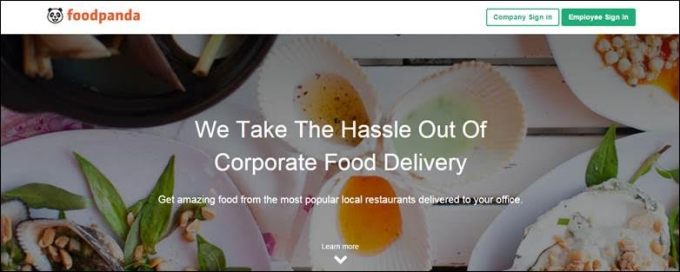Foodpanda, the food delivery on-demand service backed by Germany’s Rocket Internet, has ventured into the world of corporations after it introduced a dedicated service for business customers that it hopes will massively increase its income.
The company’s service is present in 38 countries, primarily emerging markets — thanks to a major spree of acquisitions over the past year — but its corporate offering has initially launched in just six countries in Asia: India, Singapore, Hong Kong, Thailand, Indonesia, and the Philippines.
The idea behind this new offering — which is housed in a separate app and web-based client — is simple. Foodpanda co-founder and CEO Ralf Wenzel told TechCrunch that around a quarter of its orders come from corporate addresses but, with many companies subsidizing employee food or providing allowances, Foodpanda smells an opportunity to hone in on that lucrative market.
Wenzel predicted that, over time, orders to corporate customers could represent more than 50 percent of income. Given that Foodpanda continues to lose money, though revenue is increasing, the business segment will be a very crucial one for its future.
How it works is quite simple. Corporate customers gain access to the dedicated business service, through which their employees can order food. Wenzel said the selection of restaurants may be different — Foodpanda only selects those that meet a higher standard, e.g. quicker delivery time, for corporates — while each corporate client can select variables, such as budget per employee.
The idea is that this simplifies the experience, meaning no need to file invoices, approve expenses, etc.
For Foodpanda, corporate clients act much like a subscription, as Wenzel put in, in so much as they are a guaranteed recurring revenue stream — to a point.
Foodpanda isn’t revealing the identity of its corporate customers yet, but it said that they include “multinationals, corporates and insurance companies” across the Asia region. The company plans to expand the business service into more markets over time, the addition of more regional, corporate clients could expedite that expansion process.

Foodpanda, which has raised $310 million to date — including a $100 million investment led by Goldman Sachs earlier this year– has come under fire in some parts of the world for inconsistent service and, in India, a poor working culture and many fake listings on its platform.
In response to those challenges, Wenzel admitted that the company had changed how it manages its business over the past few months.
“We have a more sophisticated and drastic selection [process and we more] carefully manage our inventory,” he explained. “We’re building out our own last mile capabilities [so we can] control the end-to-end experience, we make sure we work with the right restaurants and are taking more responsibility on the last mile delivery.”
Problems, such as those in India, have necessitated a change in how Foodpanda views itself, Wenzel claimed:
We started out being more of a marketplace to connect restaurants to consumers, but, especially in food and certain markets, you need to take much stronger control. We iterated a lot to ensure quality control and we’ve taken a higher responsibility of the end-to-end experience.
That’s important because, for example, if I order food through a platform and the restaurant takes two hours to delivery it, I might not go back to the service even if though [the platform itself] doesn’t have anything to do with the quality of the food or the delivery service. It’s no longer enough to be a simple website or app.
With that in mind, Wenzel said that we can expect more changes and iterations to the Foodpanda service, which often competes without major rivals in emerging markets, in part due to Foodpanda’s global acquisition spree. While he wasn’t overly specific in his plans, Wenzel’s candor is fairy refreshing and unlike the often dour and dry responses from the CEOs of some Rocket Internet-backed companies.
“The food tech space needs to keep innovating,” Wenzel told me. “Even Foodpanda lacks innovation… we want to invest in technology that is new and disruptive.”
Nonetheless, it’s impossible to ignore that users in many of Foodpanda’s markets, though active on the service, are far from delighted at the general quality of its service. While management appear to be aware of the need to improve, I’ve met and spoken to plenty of entrepreneurs who believe that they can do food delivery better than Foodpanda.
